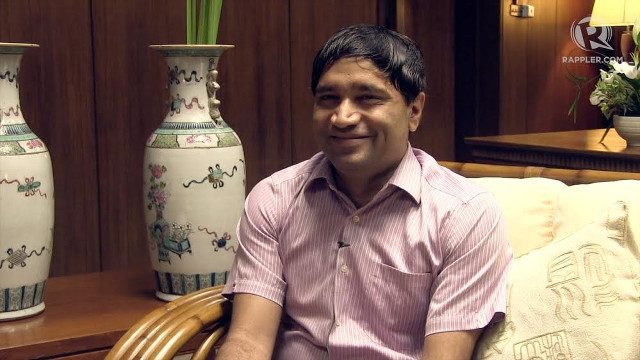SUMMARY
This is AI generated summarization, which may have errors. For context, always refer to the full article.

MANILA, Philippines – How can one man stand against a tidal wave of corruption?
Sanjiv Chaturvedi, one of this year’s Ramon Magsaysay awardees, says one man can’t. But a team has a shot.
The soft-spoken yet earnest 40-year-old from India credits support from others for his string of victories against dishonesty and greed.
“I was not the sole mover. I had hardworking staff. There were very good NGOs, the judiciary and media were very supportive,” he tells Rappler.
Indian media tag him as a “whistleblower” in headlines – and there have been a lot of them.
His first case had been the illegal construction of a canal inside a protected area, Saraswati Wildlife Sanctuary. The contractors built the canal for show but used the opportunity to earn kickbacks and poach rare animals inside the park.
Chaturvedi was then only 28 years old, a new recruit of the Indian Forest Service, a government agency.
He went on to unearth other irregularities: the rigging of government auctions, a reforestation scam, the use of public funds for an herbal park owned by a high-ranking officials, and more.
In his next job as the chief vigilance officer of a prestigious medical science institute, he pursued 165 cases of corruption in two years.
His most memorable case, he says, involved well-connected shop-owners selling dubious medicines within the institute’s premises.
Patients complained about side effects from taking the drugs, but because of the shop owner’s political links, they could not easily be evicted.
When Chaturvedi issued notices to them, a proposal to transfer him quickly followed suit. But intervention from government health officials helped Chaturvedi keep the job.
Finally, the owners were evicted and later on defeated by Chaturvedi and his team in a court case.
“It had direct impact on the lives and well-being of the poor patients who were coming into the institute. So this is a case I am most proud of,” he says.
Heart of a warrior
With a haircut he has not changed in years and a voice always spoken in moderate volume, Chaturvedi does not call attention to himself.
But as a warrior of crime, his mettle has been tested too many times.
He has been slammed with criminal cases, including a murder case. He has endured months of suspension from work during which he gets paid half his salary. He has been asked to name his price to keep quiet.
Tacitly, officials have offered him “creamy postings,” or government positions with the best opportunities to make illegal money.
“Obviously, I had no time for my personal life and it was very difficult,” he says.
Fighting corruption, says Chaturvedi, requires one basic thing: you have to be incorruptible.
As soon as he earned a reputation for consistently exposing crooks in power, anonymous phone calls and text messages came in, most of which turned out to be accurate.
He would get late-night visits in his office from people with information.
“Once you start in an impartial manner, people have faith in you. You should be very honest, very sincere. You should be doing justice to your duty,” he says.
Duty, above all
Coming from a family of civil servants, Chaturvedi says he gets his strength from his sense of duty.
“I always thought it my duty to protect our natural resources, our financial resources, because I was very clear that these belong to the people and they have first right over these things and not these corrupt people and vested interests. And these people have to be fought at any cost.”
Coming to the Philippines has allowed Chaturvedi to better appreciate the man who gave his name to the Ramon Magsaysay Awards. He says he finds solace in the words of the late Philippine president who restored the people’s faith in government.
He says:
One thing which appealed to me most was his word that it is the duty of the government to ensure that each and every person, each and every citizen, has the right to live a life of dignity. And the second thing that I saw was that once you are in the government service, you cease to belong to your family, to your party. Your entire life is for the people. And that is the biggest message for any government servant.
Chaturvedi is a recipient of the Emergent Leadership Award given to candidates aged 40 or younger.
The honor has opened up opportunities to involve the Indian youth in his anti-corruption drive.
“From now on, I plan to work on a larger scale with the youth of our country to make them aware of these problems of corruption. I plan more and more to go to the youth, to our colleges, to our new officers who are joining the service,” he says.
It all goes back to teamwork. For Chaturvedi, the legions of corrupt have to be fought by an infantry of the righteous.
“As the resistance grows against these forces, only then can these changes be brought.” – Rappler.com
Add a comment
How does this make you feel?
There are no comments yet. Add your comment to start the conversation.